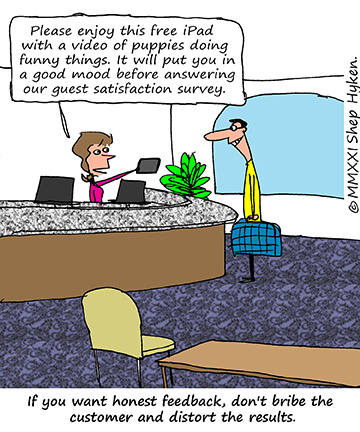To what extent will a company go to try to get customer feedback? Is it a simple email request? Is it an incentive to fill out a survey? And, if there is an incentive, can that skew the results?

One of our faithful subscribers sent in a question. At the end of a project with a customer, she sends an email requesting the customer take a short survey. She said that she gets a very low response rate. So, she sends another. Then another. On the fourth try, she writes, “Do you like coffee? My treat!”
She says that she gets a response to that almost every time. Her question to me was, “Is this a form of bribery, or is this a simple incentive?”
First, I congratulated her on her creativity and ingenuity that persuaded her customers to respond. Then I answered that a cup of coffee would not be considered bribery. It’s just a way to get attention. The only other thought I shared was to maybe make the offer on the third try. By then, it’s time to get noticed.
So, what constitutes a bribe to get feedback?
A cup of coffee gets you noticed. Some may disagree and call the cup of coffee a bribe. You could easily convince me that it is a bribe to take the survey, but I am doubtful you could convince me that a free cup of coffee is going to get a customer to leave a positive review if the customer was unhappy. But, send me a new 80-inch flat-screen TV to get me to take a survey … now that’s a bribe!
Seriously, I’m surprised at how some companies offer incentives that are obvious bribes. A customer could feel guilty if they didn’t give the company a good rating after receiving a gift card. And some companies don’t offer up a physical bribe, but they beg and plead for a good rating, often guilting the customer into filling out a survey, just to make sure the employee keeps his or her job.
I was asked by an auto dealership to rate them a 10 on their service. The service rep said that his job and salary depended on his ratings. That’s putting quite a bit of weight on my shoulders. My rating is responsible for his ability to feed his family. Had the experience been less than excellent, would I have shared truthful feedback and risked this guy not being able to take care of his family? (That’s a rhetorical question.)
The lesson here is simple.
In addition to what I’ve written in the past about feedback, consider a way to get noticed. It could be a clever email, a clever video asking for feedback, or something small, like a cup of coffee, that shouldn’t distort the results. You want feedback. It’s a history lesson that lets you know whether you’re doing a good job or if you need to improve. It’s valuable information, so do what is necessary, reasonable, and ethical to ensure you get as much feedback as possible.

